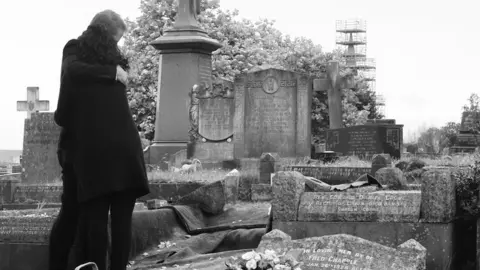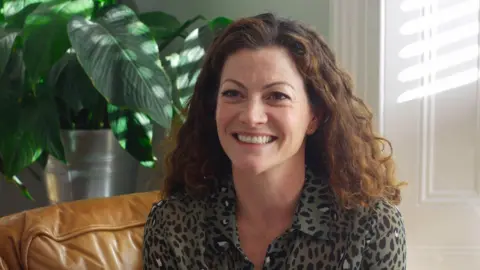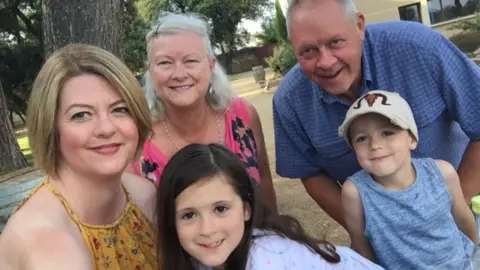Bristol grief festival to examine bereavement by Covid
 Daniel Selman
Daniel SelmanThe Covid-19 pandemic could be a "springboard" for more open attitudes towards grief, an expert has claimed.
Dr Lucy Selman, a social scientist at the University of Bristol, said the virus had brought death "centre stage".
Founder of the Good Grief Festival Dr Selman hopes the online event will open up conversations exploring human grief.
More than 100 speakers will take part including actor Robert Webb, murdered Stephen Lawrence's brother Stuart, and palliative care doctor Rachel Clarke.
 Rebecca Culverhouse
Rebecca Culverhouse The festival, planned before the pandemic struck, was born out of Dr Selman's own grief after losing her father when she was 15 and then, two years ago, the loss of her daughter who was stillborn.
More than 8,000 people have signed up to the three-day event, which starts on Friday and is being backed by the Wellcome Trust.
"Covid has brought grief and bereavement right bang into the middle of our public discussion," Dr Selman said.
"It has resulted in over 60,000 excess deaths in the UK so far, so death and dying is front page news every day.
"One silver lining about this awful situation is maybe that people are talking more about death, grief and loss in a way they haven't before."
A study between the universities of Bristol and Cardiff has sought to understand the experiences of people bereaved during the pandemic but, with many relatives unable to say goodbye, Dr Selman said she believed a "significant bereavement burden" could result in an impending mental health crisis.
 Kathryn de Prudhoe
Kathryn de PrudhoeFestival speaker Kathryn de Prudhoe, from Leeds, lost her father, Tony Clay, 60, to Covid-19 in April.
"It was just totally surreal. I was watching this disaster on the news and all of a sudden our family was part of it," she said.
Mrs de Prudhoe's 66-year-old mother went into isolation on the day Mr Clay was taken into hospital - three days before his death and for 11 days after.
"It was so difficult for me, but I was at home with my husband and kids, my mum was alone and completely traumatised," Mrs de Prudhoe said.
 Suhail Patel
Suhail PatelPsychotherapist Mrs de Prudhoe has been campaigning for the group Covid-19 Bereaved Families for Justice and called on the government to fund counselling measures.
She said: "Lots of people saw their loved ones die really agonising deaths. Lots of people died at home, and some, like with my dad, were taken into hospital and that was the last time we ever saw him. Those things are going to have a huge impact on people."
 Laura Gallant
Laura GallantOnline panel discussions will include The Covid Cataclysm: How Do We Grieve for "Normal"? , while the festival's "Grief School" will look into different types of loss, including grief after suicide, childhood bereavement, stillbirth, pet loss and traumatic loss.
Palliative care consultant Dr Rachel Clarke said that in a year "encapsulated by death" any attempt to broaden out the conversation about grief was incredibly valuable.
"Not only are 65,000 families grieving for the loss of a loved one due to Covid, but in a profound sense the whole country is grieving," she said.
"We have all lost something in 2020. For a festival of grief to come at this time it could not be more timely. It is speaking to a national outpouring of grief for every single thing we have lost this year."

- COVID EXPLAINED: Why is coronavirus such a threat?
- LOCKDOWN LOOK-UP: The rules in your area
- SYMPTOMS: What are they and how to guard against them?
- SOCIAL DISTANCING: Can I give my friends a hug?

